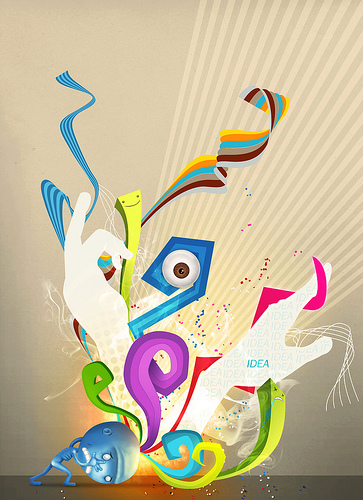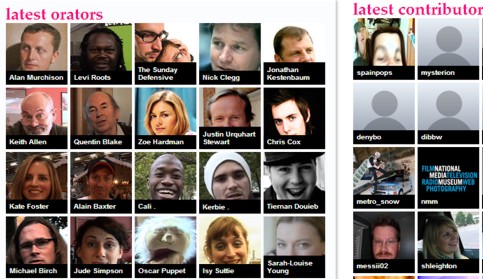
Photo credit: khoraxis
Psychblog has posted a controversial article entitled Brainstorming reloaded which claims that brainstorming doesn’t work after all. Brainstorming, as a method of pooling the group’s ideas, has been around for a long time. I know that Australian teacher librarians, at least, still promote it as a starting point for research, and subject teachers are also using it as a springboard to discussion within a topic.
Brainstorming certainly looks like a great way of dealing with some of the problems associated with decision-making and creativity in groups, such as groupthink and people’s failure to share information effectively. By suspending evaluation, encouraging a relaxed atmosphere and quantity over quality, the brainstorming session is supposed to foster creativity.
But the article goes on to undermine the effectiveness of brainstorming:
But now we know that brainstorming doesn’t actually work that well. Experiment after experiment has shown that people in brainstorming sessions produce fewer and lower quality ideas than those working alone (Furnham, 2000). Here’s why:
- Social loafing: people slack off to a frightening degree in certain types of group situations like brainstorming.
- Evaluation apprehension: although evaluation isn’t allowed in a traditional brainstorming session, everyone knows others are scrutinising their input.
- Production blocking: while one person is talking the others have to wait. They then forget or dismiss their ideas, which consequently never see the light of day.
The article suggests that brainstorming be conducted online in order to achieve higher quality results:
In this research brainstormers typed in their ideas to a computer which also displayed other people’s ideas at the same time. This rather neatly gets around the social loafing and production blocking problems.
The conclusion of the psychological literature, therefore, is that people should be encouraged to generate ideas on their own and meetings should be used to evaluate these ideas.
I’m not sure what you might think about this, but something doesn’t sit right with me. It sounds like a good idea to simultaneously generate ideas online – I like the idea of all the contributions being visible real-time – but I think the classroom has its own group dynamics. Perhaps this research is more relevant to business. I think that there is a group dynamics and sense of trust which has hopefully been created by the classroom teacher. I’m not sure if secondary students are too critical of their peers’ suggestions in the brainstorming process.
Even if you set up the individual and simultaneous online brainstorming, wouldn’t students be threatened by the competitiveness of generating as many ideas as their peers? This may not be obvious online, but they could easily tell if others are typing in suggestions or just sitting there. You would also have the problem of those who think quickly getting in first with ideas that others may have come to later. Altogether, I think you’d have the same problems. At least with the teacher mediating an oral brainstorming session, he/she would be aware of those needing encouragement to contribute.
However, I do like the idea of an online brainstorming tool which allows every student’s contribution to be seen. Online brainstorming tools like bubbl.us are good, but are not a collaborative tool. Collaborative online brainstorming sounds like a solution to the isolation of a regular online tool. The article points out the importance of the group in the activity:
Why not just send people off individually to generate ideas if this is more efficient? The answer is because of its ability to build consensus by giving participants the feeling of involvement in the process. People who have participated in the creative stage are likely to be more motivated to carry out the group’s decision.
What do you think? What are your experiences with brainstorming? Your thoughts about the effectiveness of brainstorming, either as part of classroom discussion with the teacher writing down the group’s ideas on the board, or students using applications like Inspiration or bubbl.us
Am I missing something or is there a collaborative online brainstorming tool which I should be using?
And what is your reaction to the last line of the article?
Groups aren’t where ideas are born, but where they come to sink or swim.



